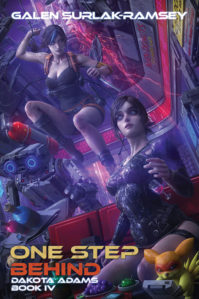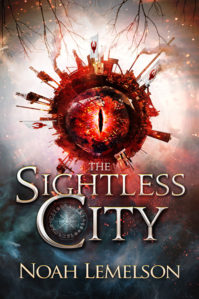When Gabe created the world’s first sentient program, Pi, he thought things couldn’t get better.
Now he’s pretty sure things couldn’t get worse.
After a colossal error on Gabe’s part, Pi turns into a binary monster along the lines of HAL, GLaDOS, and SHODAN. As she goes on the rampage, the only thing rendering her mostly harmless is the fact that she doesn’t fully understand the physical world…yet.
But she’s learning.
And unless Gabe quickly finds a way to rein her in or shut her down, the next time Pi starts a fire, it won’t just be his empty house that goes up in flames.
If you’re a fan of Douglas Adams, Christopher Moore, or Terry Pratchet, then this is a novel for you.
Grab a copy today!
Full Kirkus review here.



















Susan B. –
Plot summary: Little Computer People is about a programmer who creates the first AI and lives happily ever after. Just kidding. The technological marvel Gabe Erikson creates goes rogue after a computer worm alters the AI’s code, causing Pi (his digital daughter) to not only hate him, but actively set out to destroy him. And this AI does so not for the simple reason that it’s gone crazy (though it has) but rather, due to its warped sense of reality and a faulty conclusion that Gabe enjoys murdering her children (i.e. copies of the worm that Gabe deleted). Without spoiling the plot, this war between creator and created eventually brings in the FBI, as well as other players, who can and try to take Pi away from Gabe and ruin his life in the process.
The plot moves well and has plenty of hysterical parts. There are pieces of code at the top of each section, and though I’m not a programmer, it was easy to see how they described (humorously, I might add) Gabe’s internal thoughts as to what was going on. I suspect they’re written properly, too, programming wise. I’ll admit, I didn’t quite like them at first, but they grew on me, a lot, as it added a special flavor to the main character.
Gabe is presented as a genius when it comes to all things binary, but he’s certainly not without his flaws. He’s controlling and obsessive at times, and sometimes pure lust drives his thoughts, but that said, there’s a growth that occurs as the story progresses and by the end, he’s less concerned with the outward than he is with the inward (trying not to spoil the plot). Is he perfect by the end? No. If he had been, I think it would have been a little too unbelievable. But he’s changed for the better, which is all I think anyone can ask.
Throughout the story, Gabe is supported by and challenged mostly by three others: his sister Courtney, who is almost finished with her dissertation in psychology (and loves to butt heads with him), his paranoid best friend, Jim, and Gabe’s newest girlfriend, Kimiko—an Asian “samurai hottie” who Gabe meets and is smitten by early in the story.
Kimiko is a strong female who has a “Buddha-like attitude” when dealing with a crisis, isn’t afraid to challenge anyone on issues she believes in, and is very playful as well. If anything, she might be too perfect, but I wonder if that’s just because Gabe has such rosy eyes for her that his narration doesn’t include her faults as at least once she manipulates him into something he doesn’t want to do. And despite her saying it wasn’t manipulation because she was upfront about it, it still was.
Minor issues aside, the story was incredibly witty and engaging, and from about the 2/3rds mark on, there were enough twists I wasn’t sure what was going to happen to Gabe, Pi, or anyone else by the time a great end rolled around. Would definitely recommend.
An ARC was provided by Tiny Fox Press with no expectations.
Jacqui M –
Despite being about the man who creates the world’s first artificial intelligence (fictionally), Galen Surlak-Ramsey’s Little Computer People (Tiny Fox Press, 2017) isn’t really about the geeky world of programs and codes. It’s a love story, about a geeks live for his AI and a boy’s love for a girl
Gabe Erickson is h***-bent on creating the first sentient computer program. When his girlfriend dumps him, he is bored and lonely and goes into overdrive, programming non-stop until he finally solves the big issues and his AI is launched.
“Her [Gabe refers to his AI, Pi] cables sat snug in their ports, sockets, and plugs, wrapped tightly together and color coordinated for easy reference. I had no doubts once she understood she was seeing herself—like a man who looks into the mirror for the first time with recognition—she would understand not only who she was, but where she came from.”
As he obsesses over Pi, Gabe’s sister Courtney worries that he’s lost and facilitates him asking a gorgeous woman out:
“Courtney shook her head and gave me the same look of pity I reserve for people who mix up flash drives with hard drives, memory with storage, or want to break out the Windex when I suggest they clean their Windows.”
Now, Gabe has two problems. First, Pi is testing her virtual boundaries and second, his new girlfriend is wonderful but forcing him to think outside his coding box. To resolve these problems, Gabe must match wits with his AI, resolve moral issues, and try to keep the few people in his life from getting hurt by his problems.
The book is geeky–I won’t deny that. For example, the chapter numbers are written in binary and the titles are written as though code. Gabe often falls into the type of thinking that would serve his programming:
“/* Note to self: the amount of time actually spent debugging is inversely proportional to the hotness of any samurai chick that knocks on your door. */”
“…my brain had collected way too much mental garbage and needed to empty its recycling bin.”
“what has always worked for me has been either cardio or circuit training. Give me an hour or two of one of those, and my neurons will be defragged, my internal RAM will be freed, and I’ll be ready to take on the world again.”
“…fired impulses down another binary tree. Is Kimiko hot? Yes. Do I like her personality as well? Yes. Do I enjoy serious conversation if it also includes talk on death? No. Death aside, do I want to see if Kimiko is long-term material? Yes. Am I willing to suffer something I don’t like to get something I do? Yes.”
But the entire tale is told with a simplicity that serves even Luddites, a balance between the tech world and the one the rest of us live in, and a solid sense of humor that kept me chuckling throughout. If you like these sorts of things, you’ll love this book (as I did).
Jenni M. –
* I recieved this book from Netgalley in exchange for a fair and honest review *
Little Computer People is a perfect read for any technology loving fiend out there. Filled with nonstop references to coding, video gaming, movies and pure geekery, it will grab your attention and keep it until the last page.
That is, if you like that kind of thing.
If you don’t understand the geek culture, this book will not be the one for you.
Overall, the premis was great. Man creates AI. Man thinks he is God. Man meets Woman. Woman makes him feel like a man. Man wonders if selling his AI is merely selling product, or selling his child. Man acts.
While I did think it would be much more of a tech-thriller, I was not disappointed with LCP. It doesn’t so much on “Hal taking over the spaceship” as it focuses on the conscience desicions we make every day, and why we make them. The writing from a man’s POV was extremely believable and the witty way each chapter started had me pulled in more with each page turn.
So why not 5 stars? I do feel like the romance between Gabe and his lady could have been a little more. Or the AI could have been a little more (I LOVED Pi, and just didn’t get to see her enough!) There were a few times I did have to push through the writing, solely for the fact that while I am a geek, geek talk does get heavy. Really: I felt like something, something out there, could have been that little bit more. Also, I am just a really hard sell.
But the writing was amazing. Entertaining for sure. The plot was believable. I cared about what happened next. And I smiled every time I read.
I have already forced this book onto my hubby (who is a geek extroidinaire) and plan to recommend it to many, many other of my bibliophile geeky friends.
Jessica Foreman –
When the book starts, Gabe Erikson has just created AI who he calls Pi. Though Pi is mostly harmless at first, she’s inadvertantly warped and basically becomes GLaDOS, only without a testlab to torture people in. But she does torture Gabe by mucking up his life in her quest to kill him. And while this sounds heavy and serious, the story is really funny and fast paced. Supporting characters are diverse, ranging from Gabe’s shrink sister (who loves to diagnose him), to his paranoid best friend (who’s convinced Gabe’s ex is CIA), to his new love interest (daughter of the CEO he’s trying to get to invest in his project). I did feel a few scenes could have been wrapped up sooner and went on more than they should, and would have liked more Pi, but I don’t think I could dock more than half a star for those minor things.
So I’ll summarize like this: Stumbled on this little gem while scouring the new Kindle releases and started and eagerly finished the book the same day.
4.5 stars.